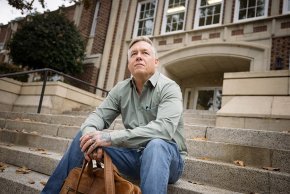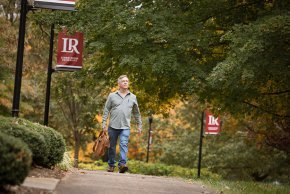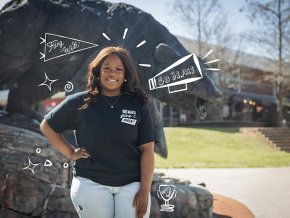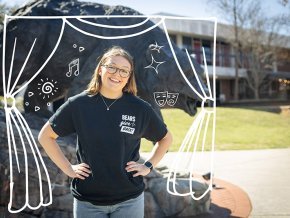
Starting over and giving back
Serving in the United States armed forces means active participation in the events that define world history. In 1988, Eric Dunaway ’26 was a 20-year-old operation specialist for the U.S. Navy aboard the USS Badger III – a Knox-class frigate – when its crew rescued a boat containing Vietnamese refugees in the South China Sea.

“We took on board 57 survivors of a group that had originally numbered 104. They lost a lot along the way because of dehydration, starvation, sharks – there were so many dangers out there for them,” Dunaway explained. “We transported them to Subic Bay in the Philippines.”
From the end of the Vietnam War in 1975 through the mid-1990s, more than three million refugees fled Vietnam, Cambodia and Laos, making their way to camps in neighboring countries for a chance to get to the United States or Europe. Hundreds of thousands of these refugees became known as “boat people” as they attempted their journeys in small, leaky vessels with few supplies – many did not survive.
“The survivors on that boat were so starved, they were really just skin and bones. We had to carry them onto our ship,” said Dunaway. “Later, I was diagnosed with post-traumatic stress disorder (PTSD) because of that.”

Dunaway left the Navy in August 1989. Like many veterans, he struggled with the loss of structure and PTSD caused by memories of his experiences. He turned to alcohol as a coping mechanism. Decades of that struggle led him to the Veterans Treatment Court (VTC) of Catawba County in January 2022.
“Veterans are so used to structure, it’s hard to adapt when you get out. Some people react well to it, and some don’t – I didn’t. I developed a drinking problem and had DWIs, so I ended up in VTC,” he shared. “They tell you how structured it’s going to be, therapy and classes every week. I got back into a structured program, and it’s opened up so many doors for me. I couldn’t repay them in a lifetime, but if sharing my story helps another veteran, that’s a start.”
Working his way through the program and graduating from VTC in May 2023 changed everything for Dunaway.
“It’s still such an important part of my life – I keep in touch with the manager over there, and I’ve just been asked to mentor another veteran, which I’ve accepted,” he said. “Also, I was recently hired as a pre-trial services coordinator at the courthouse. That all happened because of the VTC. They opened up the opportunity.”
Another opportunity that opened up for Dunaway was the chance to finish college. With his benefits through the Veterans Administration (VA), Dunaway enrolled at Lenoir-Rhyne University in fall 2024, majoring in human services and communications with a minor in criminal justice.

“I quit college 30 years ago. I just took a summer off and never went back, so part of getting my degree is for the personal accomplishment,” he shared. “But I also want to give back to the system that has done so much for me. There are a lot of veterans in need out there, so the degree will allow me more opportunities to work with them, either through the VTC or the VA.”
Lenoir-Rhyne offered the majors he wanted and allowed him to have the in-person college experience with an easy commute.
“I wanted to get the experience of what I missed when I was younger, going to football games, getting the experience. I get to say ‘Yeah, I’m an LR Bear!’” said Dunaway. “The students talk to me like I’m any other student. My professors are knowledgeable, and the classes are useful to apply outside of class. I’m enjoying it and making great grades – I got an opportunity and I’m taking full advantage of it.”

From the sports sidelines to the admission office, Zaniya Parks ’25 shows in her journey, the LR spirit isn’t just about game day—it’s about giving back.
View More
Megan Bedingfield '25 followed her heart to Lenoir-Rhyne and found her place on the stage, where she shares her passion for music, theatre and the arts with her classmates and community.
View More